Second Chapters: Sidney Escowitz’s Art of Glass
Sidney Escowitz makes the most intricate and beautiful sculptures out of glass. The individual components of his creations are cut, blown, fused and sometimes glued together. Today his works command up to $5,000 in galleries throughout southern Florida.
Glass art began as a hobby when the native New Yorker, now 76, retired, moved to Lake Worth, Florida, and was looking for something to occupy his time. “I was going crazy and had nothing to do. It fulfilled a need,” he says.
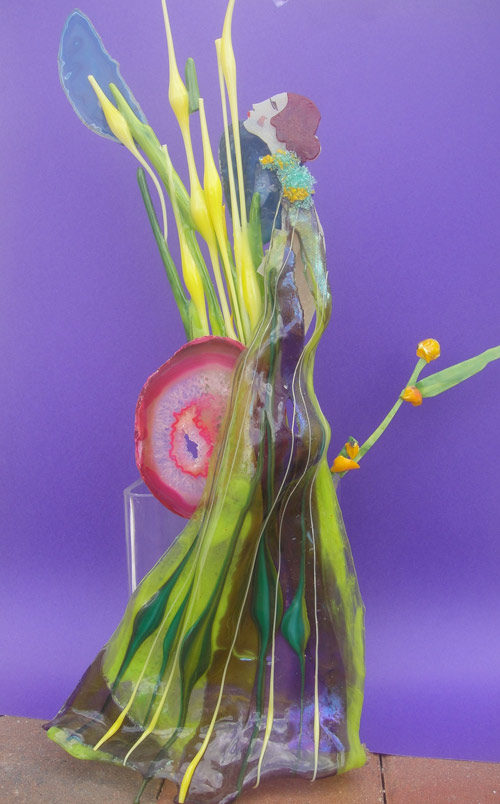
Escowitz wasn’t new to the world of art and design. He began his career in the 1960s in New York as layout artist for none other than The Saturday Evening Post as well as its sister publication, Ladies’ Home Journal. While at the Post, he worked and hobnobbed with celebrity photographers, including Richard Avedon, Francesco Scavullo, and Diane Arbus. While he never actually met the Post’s most famous illustrator, Norman Rockwell, he was responsible for preparing Rockwell’s finished paintings for the engraving process.
Interestingly, Rockwell’s works, which command eight-figure sums today, were perceived to have little value back then. “There were closets full of Rockwells,” recalls Escowitz. “They were just stacked all over the place.”
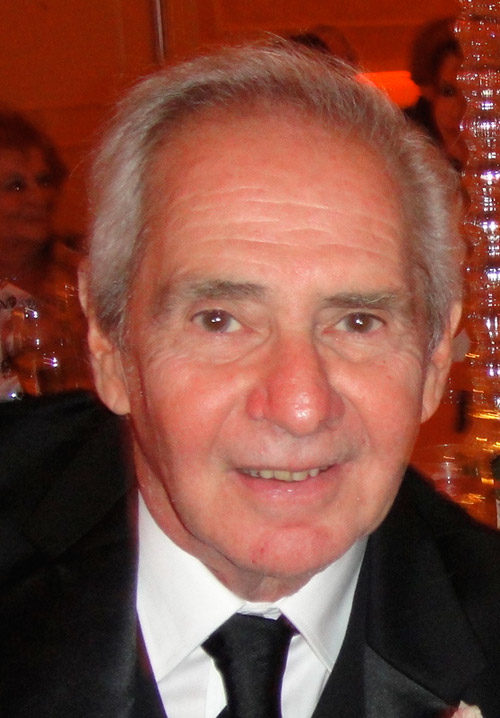
He moved on to work for the Simplicity Pattern company, first as an artist and ultimately as art director responsible for the marketing and promotion of the patterns. Later, he would become vice president of Vogue Patterns, which included Butterick.
“My whole career was around fashion,” says Escowitz, a slender, intense man whose speech patterns reflect his upbringing on Manhattan’s lower east side. Many of his works center around stylish female figures with an art nouveau ambiance. “That’s where I come from. I love that look, and I try to keep that kind of feel.”
To learn the craft of glass art, Escowitz went back to school early in his retirement. He studied with numerous masters, some in Florida, where he’d made his new home; others overseas. Today, he draws inspiration from all his teachers, and his work is eclectic and highly original.
He often starts with a simple figure and builds from there. It’s a complex process that begins with cutting the pieces of glass into the shapes he wants using a special jigsaw equipped with a diamond blade. Next, he begins layering them — balancing shape and color with his trained eye.
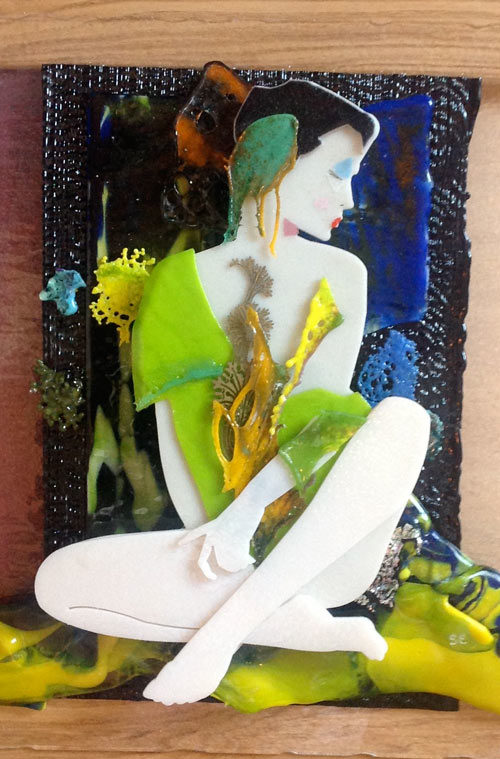
There’s a bit of magic involved: “The difference between how I work and most people work is they start out with a drawing and they plan out what they’re going to do,” he says. “I take pieces of glass from all over. I might take a flat piece and a round piece and a bird shape or a female figure and put them together to see what happens.”
Glass art is imprecise by definition. And that is a part of the appeal. “You never really tell what is going to come out of the kiln,” he says.
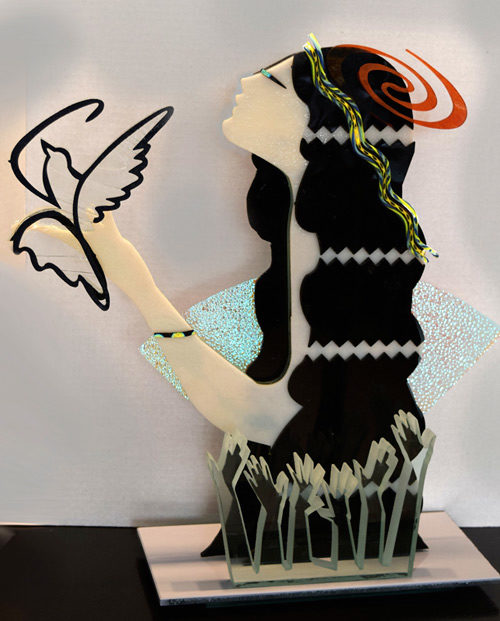
His wife Barbara describes herself as “tech support.” Highly skilled in the workings of the kiln, she sets the programs that govern the firing process. Some of the components in his glass sculptures are fused together under high heat, which causes the pieces to melt into each other, frequently distorting in unexpected ways. Others are “tacked” together at a lower temperature that causes layers to stick together. Escowitz also defies glass art tradition by using glue. “I work with the same glue used to hold the tiles in place on the space shuttle during re-entry from orbit. It’s the only thing that holds up in the heat of the kiln. It’s wild!”
After seven years of experimenting with his hobby, Escowitz figured his creations might be salable. He walked into a large art gallery in Boca Raton and met with the owner, offering to show him some of his work.
“He said, ‘well, we deal with very expensive fine art, I don’t think we have a place for something like this.’”
But, after some prodding, the gallery owner offered to take a look. Escowitz brought some pieces in and the gallery owner was impressed, if still skeptical. He offered to take just one to see if there was a market for it.
“Boom!” says Escowitz, “It sold right away. All of a sudden I got a call from him. ‘Bring over more pieces.’”
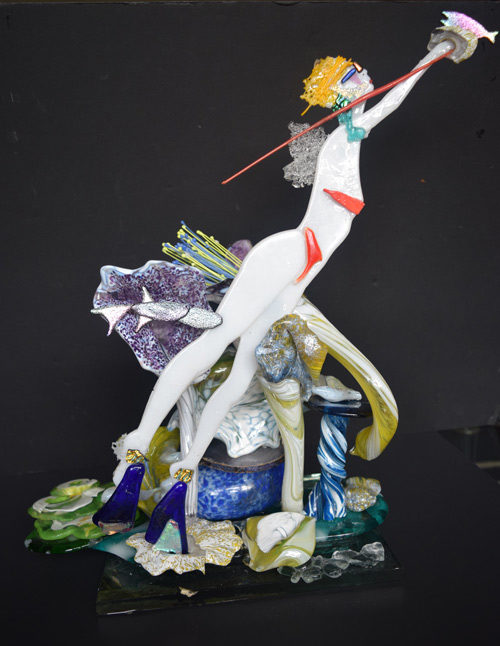
Today, his work is available in several galleries in the South Florida area. Escowitz is extremely busy keeping up with the demand for his work, while also teaching art classes at a local community center, but he’s modest about his success. “Look, there are some major glass sculptors out there. I’m just a little peanut.”
He adds that some galleries don’t want to deal with glass art. “It can crack, get ruined. It’s too dangerous.” When a gallery sells his work, to protect it from damage, he’s required to deliver it to the buyer’s home. Sometimes he’ll install it as well.
For all his success, Escowitz is the first to acknowledge that his artwork remains more a hobby than a second career. The special art glass required for his creations is highly expensive and it takes countless hours to build one of his creations. Even with a $5,000 sale, there’s little profit in it.
Clearly this is a labor of love, and his passion shows. Standing outdoors on his screened porch, surrounded by boxes of glass in all shapes, sizes and colors, Escowitz holds a green shard up to the sun and describes the “magnificent beauty” of the way light streams through. “There’s just nothing else like it,” he says.